Climate change is becoming a top-tier issue in the Democratic primary season — rising alongside the economy, healthcare, and immigration — as a major topic debated among candidates. This marks a notable shift from the 2016 presidential election cycle when the issue was little discussed.
President Trump’s rollbacks of climate and environmental regulations, and intention to withdraw from the Paris Agreement, have created a backlash among concerned voters.
Additionally, recent reports from the Intergovernmental Panel on Climate Change and ongoing extreme weather events, such as wildfires in California, flooding in the Midwest, and hurricanes in the Southeast, have focused public attention on the issue domestically. As a result, plans for climate action have become a must-have for the Democratic candidates.
As a further sign of the new prominence of climate in the election, on September 4, CNN devoted seven hours to a first-of-its-kind climate town hall event. The top 10 Democratic candidates in the 2020 presidential race spent 40 minutes each answering questions from the audience and from the network’s anchors. The event and following discussions have added some clarity to the political status of climate in today’s Democratic Party.
Democratic candidates are discussing real solutions to climate and tying the issue to people’s lives.
Although I don’t personally agree with all of the candidates’ positions, I feel energized that a serious discussion of climate, based on science and real policy ideas, will be a prominent part of the political discussion over the next year. Climate change was not a top-tier issue in the last presidential election. To make climate a key issue in the 2020 election, voters need to understand what it could mean to them on a personal level, both from climate change itself and from policies intended to mitigate climate change.
To make climate a key issue in the 2020 election, voters need to understand what it could mean to them on a personal level.
In that vein, candidates are focusing on how to broaden the climate issue and make it salient to more voters. Climate change, along with many other environmental harms, tends to impact disadvantaged communities the most. As a whole, candidates are speaking about how to help communities disproportionately affected by a changing climate and workers displaced by the transition to a low-carbon economy. The candidates are also discussing resilience and preparedness, through infrastructure investments and disaster response, and the national security dimensions of climate change. This is an overwhelmingly positive development, both in connecting more voters to the issue and in addressing barriers to voter support for climate action. The Green New Deal is far from perfect, but deserves tremendous credit for introducing notions of environmental and economic justice into the climate debate.
The top Democratic candidates all support re-engaging in the Paris Agreement and achieving net-zero greenhouse gas emissions around mid-century. The emissions reduction goal is ambitious, but in line with the latest scientific warnings and the goal of the Paris Agreement. In addition to focusing on decarbonizing the electricity and transportation sectors, a number of candidates are also discussing energy efficiency, changes in the agriculture and industrial sectors, and nature-based solutions. Although I have heard the challenge in agriculture described as a crusade to take away our nation’s cheeseburgers, the reality is a sensible discussion of how farmers can participate in emissions reductions while meeting market needs and remaining competitive. The breadth of ideas to achieve emissions reductions is necessary and welcome, and the candidates’ emphasis on American innovation to get there is well placed.
Candidates differ in their emphasis on carbon taxes.
Carbon taxes are economists’ preferred method for reducing greenhouse gas emissions. Tax the bad behavior, they say, and the economy will find the least expensive way to reduce emissions. I don’t hear the Democratic candidates arguing with the premise of carbon taxes, but they do disagree on whether they are the best tool to bring about rapid reductions in greenhouse gas emissions.
A carbon tax or another mechanism to price carbon emissions, like a cap-and-trade system, would require action from Congress. This would be a heavy lift in today’s polarized environment. Additionally, some candidates are focused on mandating change by specific dates, like decarbonizing the electricity sector by the mid-2030s. A carbon tax does not give this kind of certainty. Finally, the word “tax” can be politically toxic; it may be more expedient to focus on making polluters pay than on a tax that voters understand will be passed down to them. For these reasons, many candidates are not putting carbon taxes at the center of their platforms, instead relying on more specific emissions reduction goals and policies. Ambitious goals sound good on their face, but need serious policy mechanisms behind them to actually make a difference.
Candidates’ focus on punishing the fossil fuel industry are not productive.
Still, I’m concerned about the candidates’ approach to the U.S. and global fossil fuel industry. I’ve frequently heard the fossil fuel industry compared to tobacco, with candidates demanding that fossil fuel companies pay for the damage that their products are causing through our changing climate. The comparison to tobacco is politically popular, but not particularly valid. Although some smokers might disagree, tobacco is not necessary for economic growth and a modern society. Our energy system is.
We have an opportunity to enlist energy companies as part of the solution.
Fossil fuels built modern society and transitioning away from them toward zero-carbon energy will take time and investment. Punishing companies for past misinformation efforts might make sense, but holding these companies responsible for the entirety of climate change is misguided. Additionally, oil companies owned and operated by governments produce more than half of the world’s oil. Efforts that focus exclusively on well-known, publicly-held companies miss a key part of the industry. Huge amounts of private investment will be needed to achieve a transition to a zero-emissions economy. We have an opportunity to enlist energy companies as part of the solution as they aim to ensure their own survival in a new economy. Vilifying them eliminates the possibility of working together toward a greener future.
Additionally, I’m concerned by the candidates’ opposition to U.S. oil and gas production. Nearly all the Democratic candidates are calling for an end to public lands leasing for fossil fuel production, and a few are suggesting that the United States should no longer export fossil fuels. Again, I understand the popularity of this point of view, but I don’t believe that focusing on fossil fuel supply is the most effective strategy. Vowing to never drill another oil or gas well does not eliminate demand. Even if the world were on a path to meet the Paris Agreement goals, industry would still need to find and produce new fossil fuels to keep up with future projected demand. Oil and gas wells decline at around 5 percent per year, while even pathways that meet the ambitious Paris goals do not envision demand decreasing that quickly.
If the world will continue to need some fossil fuels for decades, should we rule out producing those fuels in the United States, where we can monitor and regulate greenhouse gas emissions and other forms of pollution? I would argue no, and that the United States could be a leader in how to produce fuels with minimal pollution and greenhouse gas emissions, and in how to wind down the industry when the time comes. Shutting down U.S. production could even increase greenhouse gas emissions in the coming years, by pushing production into areas with less strict environmental laws.
As a whole, I’m energized to see climate change become a central issue in the 2020 campaign. Differences among the candidates reflect the seriousness of the discussion, with candidates floating their own ideas rather than a single orthodox view. This rich debate and marketplace of ideas is what democracy is all about, and I think U.S. climate policy will be the better for it.
The Brookings Institution is committed to quality, independence, and impact.
We are supported by a diverse array of funders. In line with our values and policies, each Brookings publication represents the sole views of its author(s).
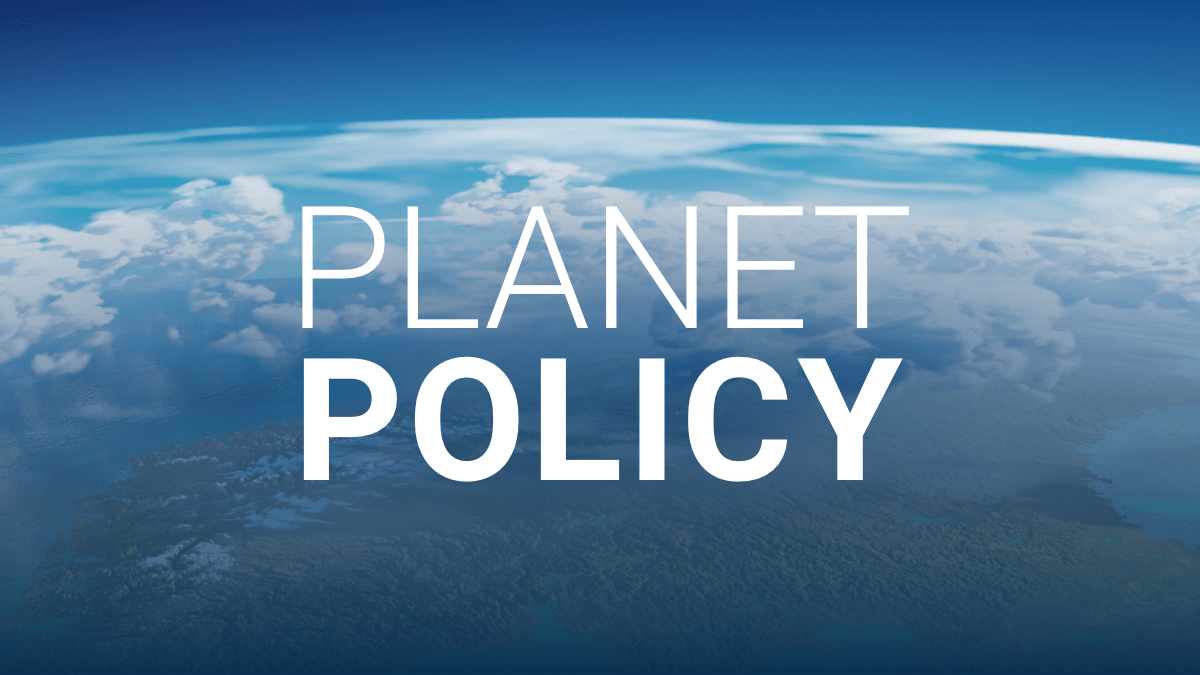
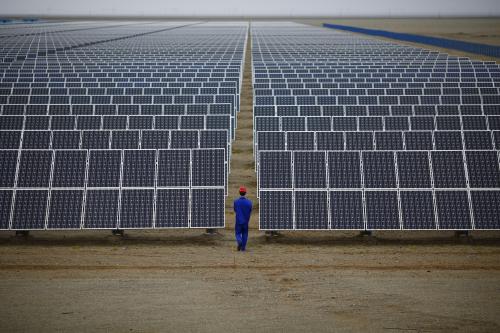
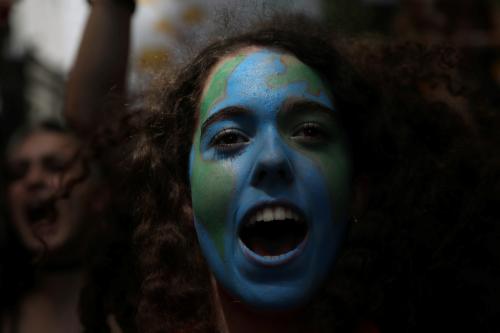

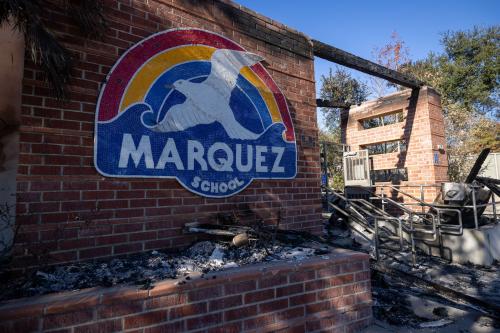

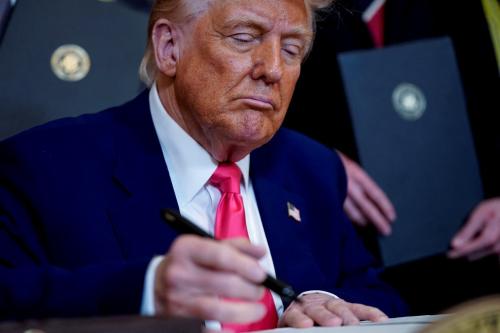
Commentary
Campaign 2020: What candidates are saying on climate change
September 13, 2019